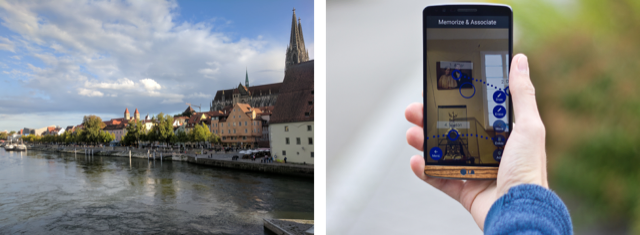Prof. Dr. Harald Reiterer
Room PZ 910
Meetings by prior arrangement.

This year’s “Mensch und Computer” took place in September and was themed under the slogan “Spielend einfach interagieren”. Host-city was Regensburg. Carla Groeschel and Katja Vock participated as Student Volunteers and thereby ensured a smooth procedure of the conference as part of the team. Jonathan Wieland presented the paper “Loci Spheres: A Mobile App Concept Based on the Method of Loci”. The method of loci is an effective technique to support the memorization and retrieval of information. The publication investigates, in which way the application of the technique can be supported by mobile devices. Therefore, three variants of the app “Loci Spheres” are introduced. In an in-the-wild study perceived system support, usage behavior, and effectiveness of the three variants are investigated.